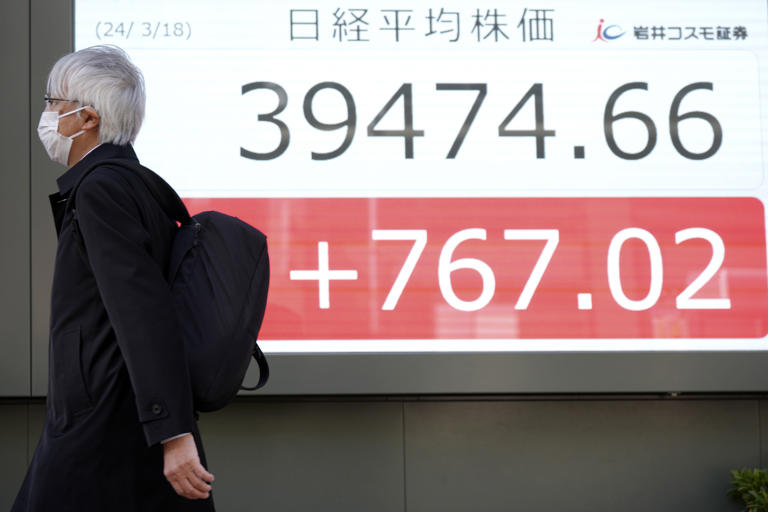The Asian stock market saw gains on Monday, with investors eagerly anticipating policy decisions from both the Bank of Japan and the Federal Reserve later in the week. Oil prices and U.S. futures also experienced increases.
Chinese economic data for January-February presented a mixed picture, with a decline in property investment offset by improvements in other indicators. In Tokyo, the Nikkei 225 index surged by 2.7% to reach 39,740.44 points.
Market participants are particularly focused on the Bank of Japan’s decision on Tuesday regarding a potential increase in its benchmark interest rate, which has remained at minus 0.1% since 2016. There is speculation that the central bank may be inclined to raise rates for the first time in 17 years due to indications of solid wage hikes by employers. This shift in monetary policy could signal a gradual departure from the extensive monetary easing measures that have been in place for many years, aimed at stimulating growth in Japan’s economy amid a declining and aging population.
In Asian markets, the Hang Seng in Hong Kong edged up by 0.1% to 16,775.55, while the Shanghai Composite index gained 1% to reach 3,084.93. Australia’s S&P/ASX 200 also saw a slight increase of 0.1% to 7,675.80, and the Kospi in South Korea advanced by 0.7% to 2,685.84. In India, the Sensex rose by 0.2%, and in Bangkok, the SET index was up by 0.3%.
On Friday, Wall Street closed lower for the second consecutive week, with the S&P 500 falling by 0.6% to 5,117.09. The Dow Jones Industrial Average dropped 0.5% to 38,714.77, and the Nasdaq composite ended 1% lower at 15,973.17. Technology stocks were among the decliners, with Adobe plunging by 13.7% after providing a weak revenue forecast. Microsoft and Broadcom both fell by 2.1%. Communication services stocks also contributed to the market’s decline, with Meta Platforms falling by 1.6% and Google parent Alphabet by 1.3%.
The market retreat occurred as investors digested reports indicating that inflation, although moderating overall, remains persistent. Inflation remains a key concern for Wall Street, especially amid expectations for the Federal Reserve to begin raising interest rates. The Fed began hiking rates in 2022 to address inflation, which had soared to as high as 9.1% that year. Recent reports on consumer and wholesale prices indicated that inflation remains elevated, fueling uncertainty about the future trajectory of monetary policy.
Investors are closely watching the Fed’s meeting this week, where officials will provide updated forecasts for interest rates. Market expectations lean toward a rate hike in June, as indicated by data from CME Group. The Fed’s benchmark rate currently stands at its highest level since 2001.
In commodity markets, U.S. benchmark crude oil rose by 56 cents to $81.60 per barrel on the New York Mercantile Exchange, while Brent crude, the international standard, gained 53 cents to $85.87 per barrel. The U.S. dollar strengthened slightly against the Japanese yen, reaching 149.17 yen from 149.03 yen, and the euro ticked up to $1.0894 from $1.0887.
